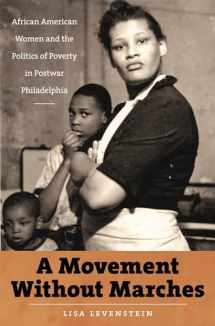
A Movement Without Marches: African American Women and the Politics of Poverty in Postwar Philadelphia (The John Hope Franklin Series in African American History and Culture)
Book details
Summary
Description
Lisa Levenstein reframes highly charged debates over the origins of chronic African American poverty and the social policies and political struggles that led to the postwar urban crisis. A Movement Without Marches follows poor black women as they traveled from some of Philadelphia's most impoverished neighborhoods into its welfare offices, courtrooms, public housing, schools, and hospitals, laying claim to an unprecedented array of government benefits and services. With these resources came new constraints, as public officials frequently responded to women's efforts by limiting benefits and attempting to control their personal lives. Scathing public narratives about women's "dependency" and their children's "illegitimacy" placed African American women and public institutions at the center of the growing opposition to black migration and civil rights in northern U.S. cities. Countering stereotypes that have long plagued public debate, Levenstein offers a new paradigm for understanding postwar U.S. history.


We would LOVE it if you could help us and other readers by reviewing the book
Book review





